South Africa's HIV/AIDS Epidemic: A Case Study Analysis
VerifiedAdded on 2023/05/30
|6
|1295
|139
Case Study
AI Summary
This case study analyzes the South African government's response to the HIV/AIDS epidemic, examining its current budget allocations and policies, which prioritize research, prevention, care, and treatment. The government implements programs like condom distribution, life skills education, and community-based care, with significant investment in antiretroviral treatment. The study further discusses the pharmaceutical industry's involvement, highlighting its pros, such as providing ART and supporting social responsibility, and cons, like high program costs and profit-driven motives. Finally, it explores the moral responsibility of stakeholders in assisting the government, emphasizing their role in supporting corporate social responsibility and ensuring ethical practices. The analysis is supported by research and references in current APA format.
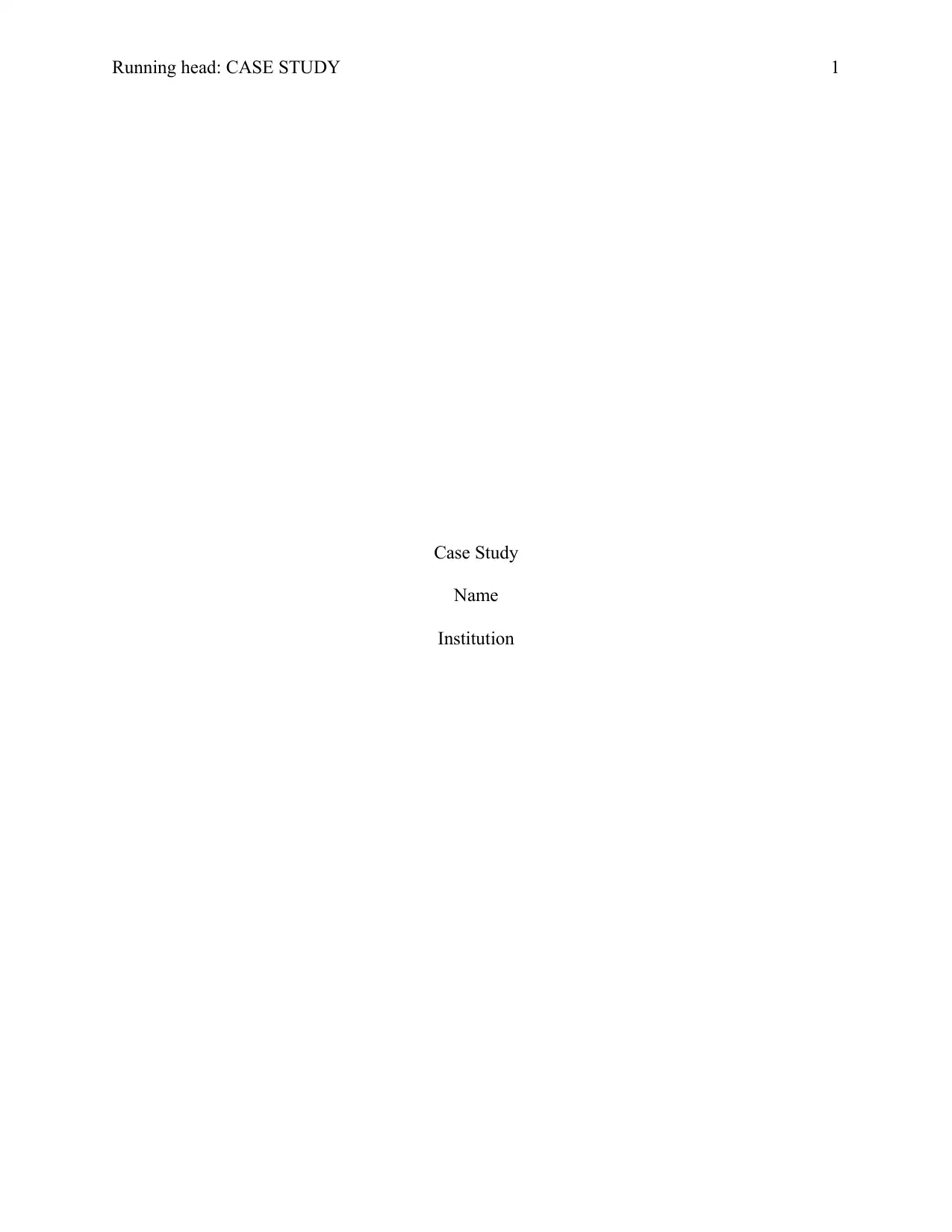
Running head: CASE STUDY 1
Case Study
Name
Institution
Case Study
Name
Institution
Paraphrase This Document
Need a fresh take? Get an instant paraphrase of this document with our AI Paraphraser
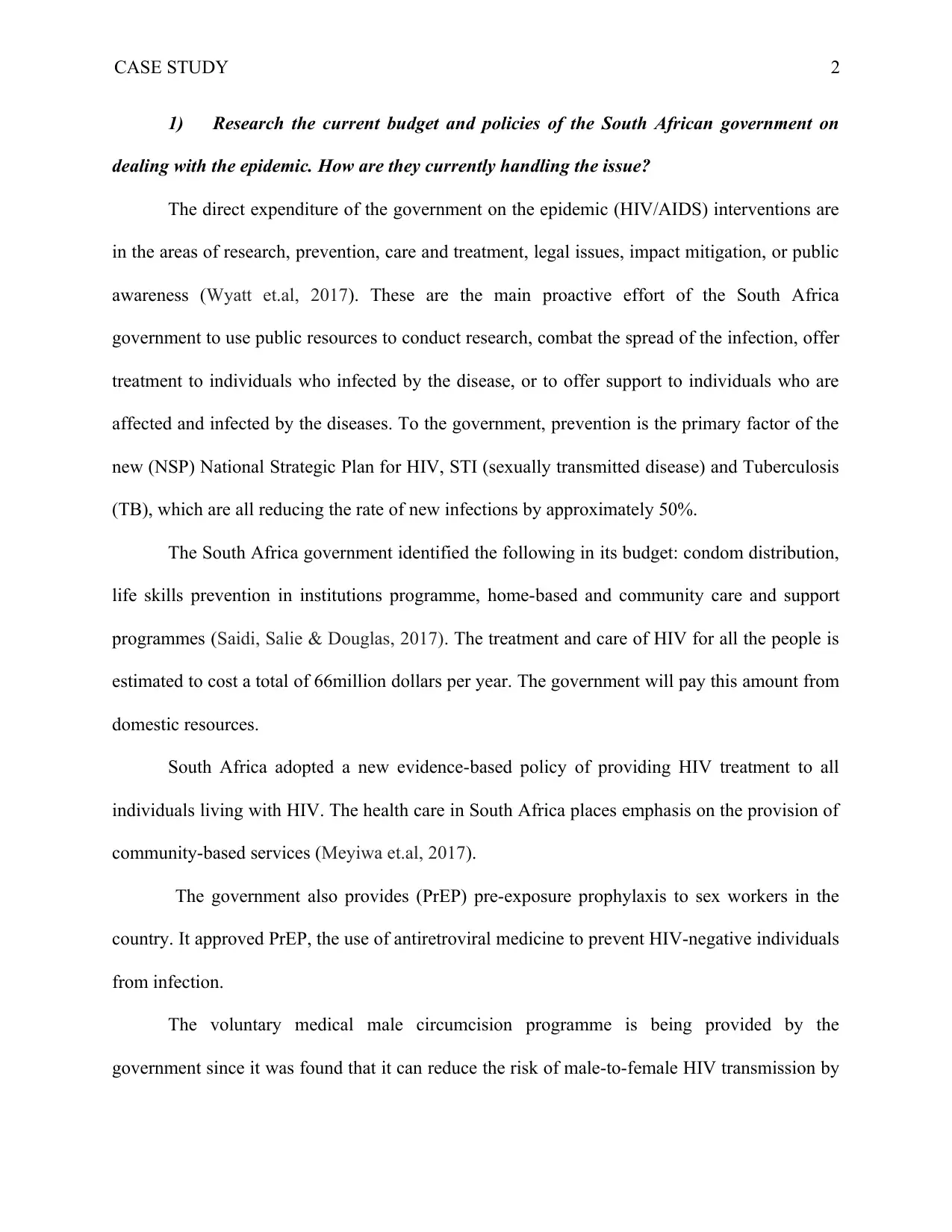
CASE STUDY 2
1) Research the current budget and policies of the South African government on
dealing with the epidemic. How are they currently handling the issue?
The direct expenditure of the government on the epidemic (HIV/AIDS) interventions are
in the areas of research, prevention, care and treatment, legal issues, impact mitigation, or public
awareness (Wyatt et.al, 2017). These are the main proactive effort of the South Africa
government to use public resources to conduct research, combat the spread of the infection, offer
treatment to individuals who infected by the disease, or to offer support to individuals who are
affected and infected by the diseases. To the government, prevention is the primary factor of the
new (NSP) National Strategic Plan for HIV, STI (sexually transmitted disease) and Tuberculosis
(TB), which are all reducing the rate of new infections by approximately 50%.
The South Africa government identified the following in its budget: condom distribution,
life skills prevention in institutions programme, home-based and community care and support
programmes (Saidi, Salie & Douglas, 2017). The treatment and care of HIV for all the people is
estimated to cost a total of 66million dollars per year. The government will pay this amount from
domestic resources.
South Africa adopted a new evidence-based policy of providing HIV treatment to all
individuals living with HIV. The health care in South Africa places emphasis on the provision of
community-based services (Meyiwa et.al, 2017).
The government also provides (PrEP) pre-exposure prophylaxis to sex workers in the
country. It approved PrEP, the use of antiretroviral medicine to prevent HIV-negative individuals
from infection.
The voluntary medical male circumcision programme is being provided by the
government since it was found that it can reduce the risk of male-to-female HIV transmission by
1) Research the current budget and policies of the South African government on
dealing with the epidemic. How are they currently handling the issue?
The direct expenditure of the government on the epidemic (HIV/AIDS) interventions are
in the areas of research, prevention, care and treatment, legal issues, impact mitigation, or public
awareness (Wyatt et.al, 2017). These are the main proactive effort of the South Africa
government to use public resources to conduct research, combat the spread of the infection, offer
treatment to individuals who infected by the disease, or to offer support to individuals who are
affected and infected by the diseases. To the government, prevention is the primary factor of the
new (NSP) National Strategic Plan for HIV, STI (sexually transmitted disease) and Tuberculosis
(TB), which are all reducing the rate of new infections by approximately 50%.
The South Africa government identified the following in its budget: condom distribution,
life skills prevention in institutions programme, home-based and community care and support
programmes (Saidi, Salie & Douglas, 2017). The treatment and care of HIV for all the people is
estimated to cost a total of 66million dollars per year. The government will pay this amount from
domestic resources.
South Africa adopted a new evidence-based policy of providing HIV treatment to all
individuals living with HIV. The health care in South Africa places emphasis on the provision of
community-based services (Meyiwa et.al, 2017).
The government also provides (PrEP) pre-exposure prophylaxis to sex workers in the
country. It approved PrEP, the use of antiretroviral medicine to prevent HIV-negative individuals
from infection.
The voluntary medical male circumcision programme is being provided by the
government since it was found that it can reduce the risk of male-to-female HIV transmission by
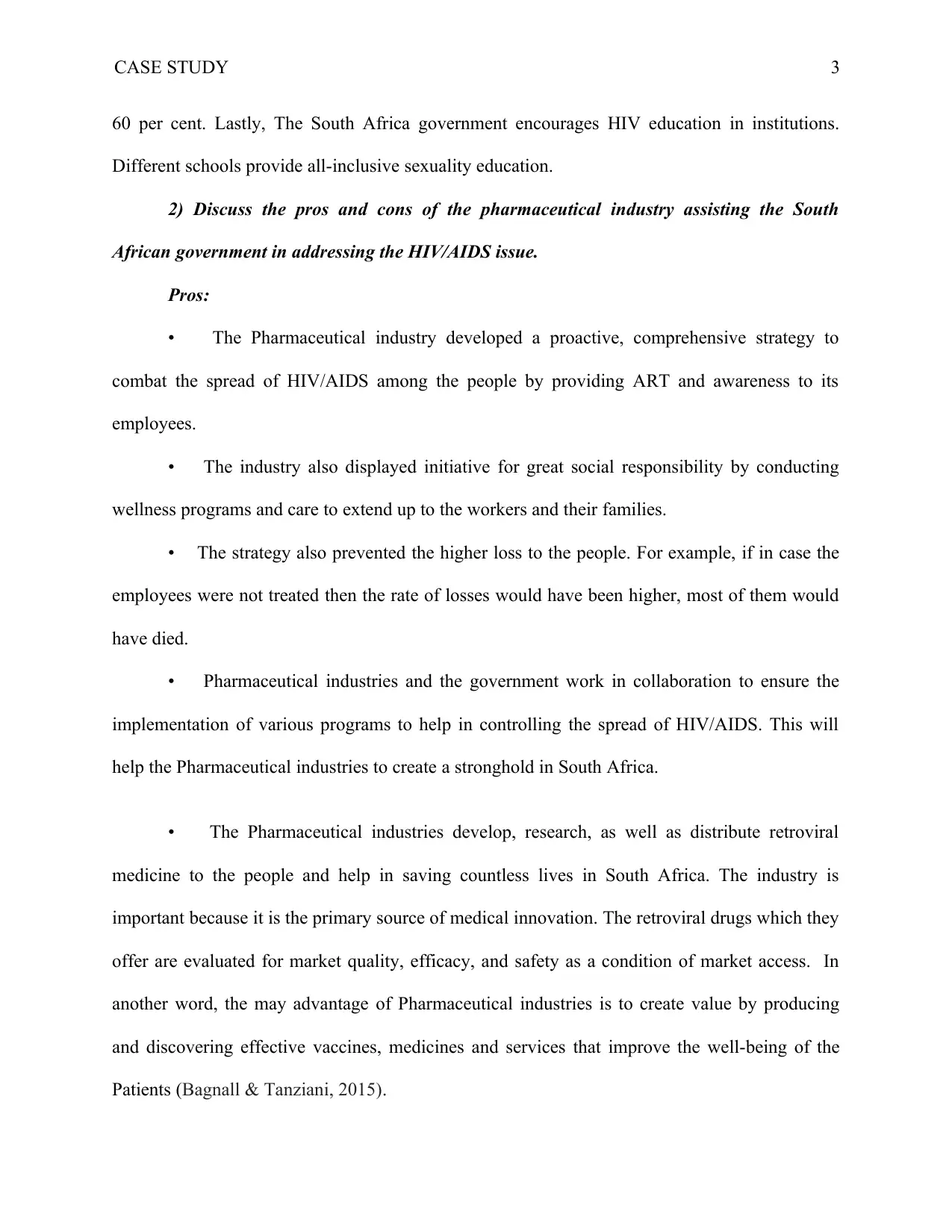
CASE STUDY 3
60 per cent. Lastly, The South Africa government encourages HIV education in institutions.
Different schools provide all-inclusive sexuality education.
2) Discuss the pros and cons of the pharmaceutical industry assisting the South
African government in addressing the HIV/AIDS issue.
Pros:
• The Pharmaceutical industry developed a proactive, comprehensive strategy to
combat the spread of HIV/AIDS among the people by providing ART and awareness to its
employees.
• The industry also displayed initiative for great social responsibility by conducting
wellness programs and care to extend up to the workers and their families.
• The strategy also prevented the higher loss to the people. For example, if in case the
employees were not treated then the rate of losses would have been higher, most of them would
have died.
• Pharmaceutical industries and the government work in collaboration to ensure the
implementation of various programs to help in controlling the spread of HIV/AIDS. This will
help the Pharmaceutical industries to create a stronghold in South Africa.
• The Pharmaceutical industries develop, research, as well as distribute retroviral
medicine to the people and help in saving countless lives in South Africa. The industry is
important because it is the primary source of medical innovation. The retroviral drugs which they
offer are evaluated for market quality, efficacy, and safety as a condition of market access. In
another word, the may advantage of Pharmaceutical industries is to create value by producing
and discovering effective vaccines, medicines and services that improve the well-being of the
Patients (Bagnall & Tanziani, 2015).
60 per cent. Lastly, The South Africa government encourages HIV education in institutions.
Different schools provide all-inclusive sexuality education.
2) Discuss the pros and cons of the pharmaceutical industry assisting the South
African government in addressing the HIV/AIDS issue.
Pros:
• The Pharmaceutical industry developed a proactive, comprehensive strategy to
combat the spread of HIV/AIDS among the people by providing ART and awareness to its
employees.
• The industry also displayed initiative for great social responsibility by conducting
wellness programs and care to extend up to the workers and their families.
• The strategy also prevented the higher loss to the people. For example, if in case the
employees were not treated then the rate of losses would have been higher, most of them would
have died.
• Pharmaceutical industries and the government work in collaboration to ensure the
implementation of various programs to help in controlling the spread of HIV/AIDS. This will
help the Pharmaceutical industries to create a stronghold in South Africa.
• The Pharmaceutical industries develop, research, as well as distribute retroviral
medicine to the people and help in saving countless lives in South Africa. The industry is
important because it is the primary source of medical innovation. The retroviral drugs which they
offer are evaluated for market quality, efficacy, and safety as a condition of market access. In
another word, the may advantage of Pharmaceutical industries is to create value by producing
and discovering effective vaccines, medicines and services that improve the well-being of the
Patients (Bagnall & Tanziani, 2015).
⊘ This is a preview!⊘
Do you want full access?
Subscribe today to unlock all pages.

Trusted by 1+ million students worldwide
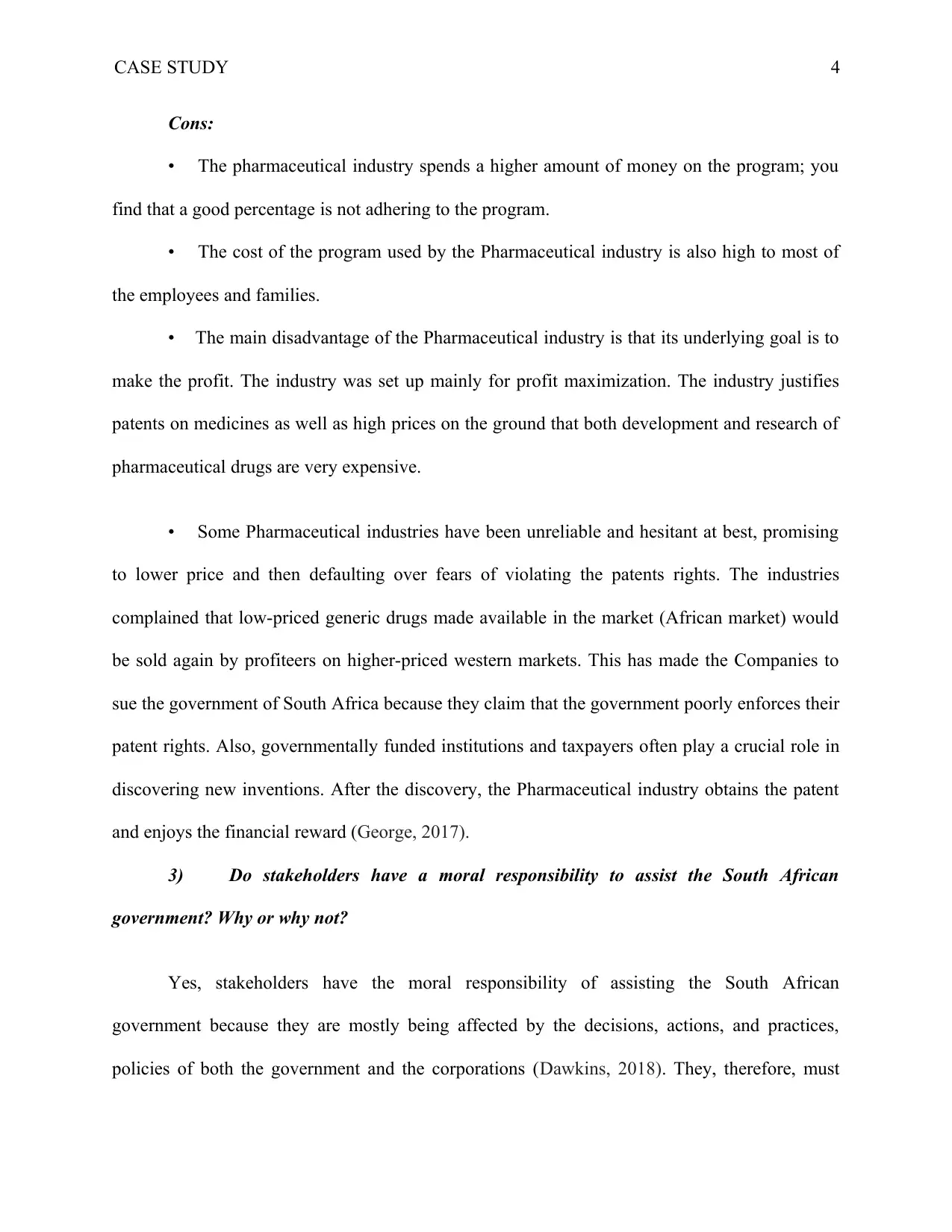
CASE STUDY 4
Cons:
• The pharmaceutical industry spends a higher amount of money on the program; you
find that a good percentage is not adhering to the program.
• The cost of the program used by the Pharmaceutical industry is also high to most of
the employees and families.
• The main disadvantage of the Pharmaceutical industry is that its underlying goal is to
make the profit. The industry was set up mainly for profit maximization. The industry justifies
patents on medicines as well as high prices on the ground that both development and research of
pharmaceutical drugs are very expensive.
• Some Pharmaceutical industries have been unreliable and hesitant at best, promising
to lower price and then defaulting over fears of violating the patents rights. The industries
complained that low-priced generic drugs made available in the market (African market) would
be sold again by profiteers on higher-priced western markets. This has made the Companies to
sue the government of South Africa because they claim that the government poorly enforces their
patent rights. Also, governmentally funded institutions and taxpayers often play a crucial role in
discovering new inventions. After the discovery, the Pharmaceutical industry obtains the patent
and enjoys the financial reward (George, 2017).
3) Do stakeholders have a moral responsibility to assist the South African
government? Why or why not?
Yes, stakeholders have the moral responsibility of assisting the South African
government because they are mostly being affected by the decisions, actions, and practices,
policies of both the government and the corporations (Dawkins, 2018). They, therefore, must
Cons:
• The pharmaceutical industry spends a higher amount of money on the program; you
find that a good percentage is not adhering to the program.
• The cost of the program used by the Pharmaceutical industry is also high to most of
the employees and families.
• The main disadvantage of the Pharmaceutical industry is that its underlying goal is to
make the profit. The industry was set up mainly for profit maximization. The industry justifies
patents on medicines as well as high prices on the ground that both development and research of
pharmaceutical drugs are very expensive.
• Some Pharmaceutical industries have been unreliable and hesitant at best, promising
to lower price and then defaulting over fears of violating the patents rights. The industries
complained that low-priced generic drugs made available in the market (African market) would
be sold again by profiteers on higher-priced western markets. This has made the Companies to
sue the government of South Africa because they claim that the government poorly enforces their
patent rights. Also, governmentally funded institutions and taxpayers often play a crucial role in
discovering new inventions. After the discovery, the Pharmaceutical industry obtains the patent
and enjoys the financial reward (George, 2017).
3) Do stakeholders have a moral responsibility to assist the South African
government? Why or why not?
Yes, stakeholders have the moral responsibility of assisting the South African
government because they are mostly being affected by the decisions, actions, and practices,
policies of both the government and the corporations (Dawkins, 2018). They, therefore, must
Paraphrase This Document
Need a fresh take? Get an instant paraphrase of this document with our AI Paraphraser
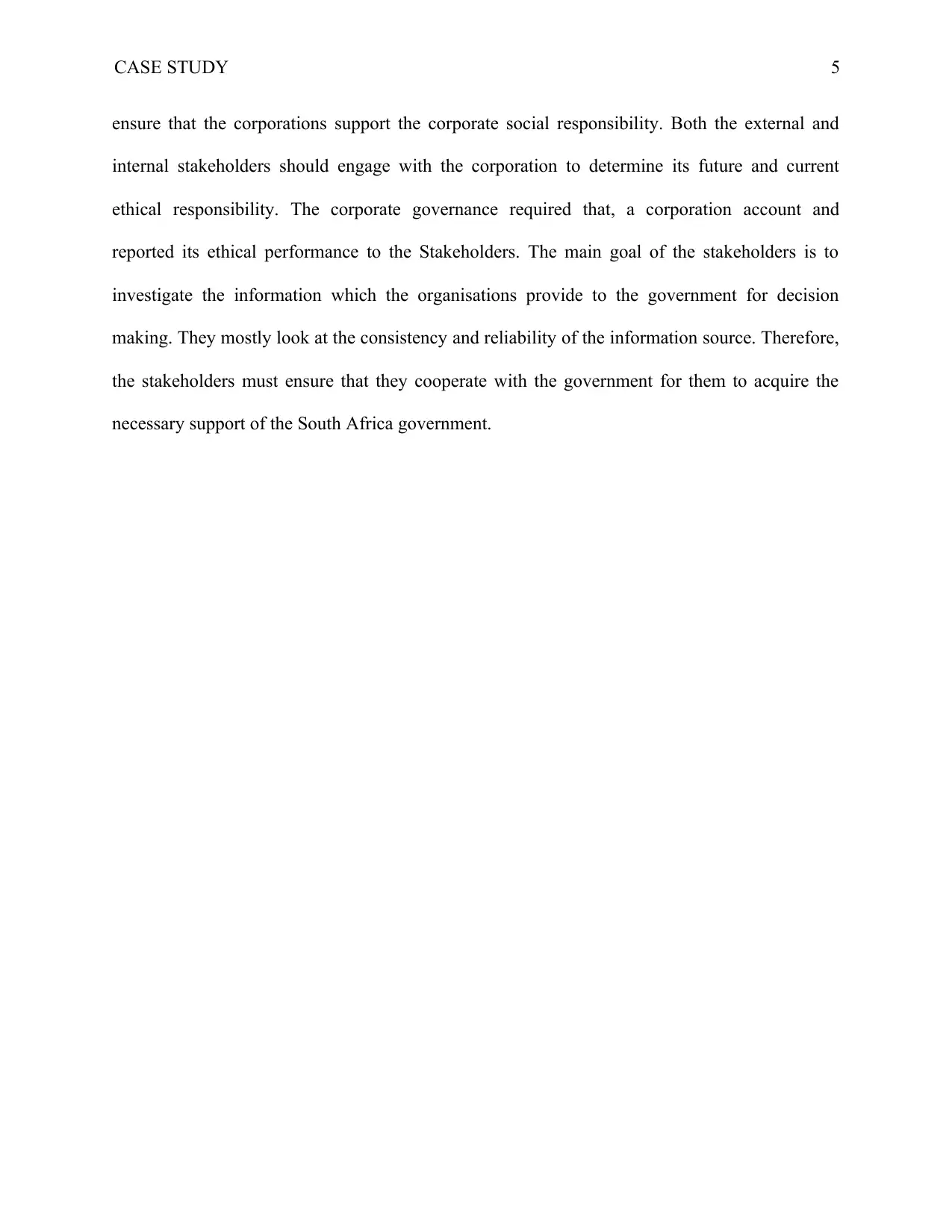
CASE STUDY 5
ensure that the corporations support the corporate social responsibility. Both the external and
internal stakeholders should engage with the corporation to determine its future and current
ethical responsibility. The corporate governance required that, a corporation account and
reported its ethical performance to the Stakeholders. The main goal of the stakeholders is to
investigate the information which the organisations provide to the government for decision
making. They mostly look at the consistency and reliability of the information source. Therefore,
the stakeholders must ensure that they cooperate with the government for them to acquire the
necessary support of the South Africa government.
ensure that the corporations support the corporate social responsibility. Both the external and
internal stakeholders should engage with the corporation to determine its future and current
ethical responsibility. The corporate governance required that, a corporation account and
reported its ethical performance to the Stakeholders. The main goal of the stakeholders is to
investigate the information which the organisations provide to the government for decision
making. They mostly look at the consistency and reliability of the information source. Therefore,
the stakeholders must ensure that they cooperate with the government for them to acquire the
necessary support of the South Africa government.
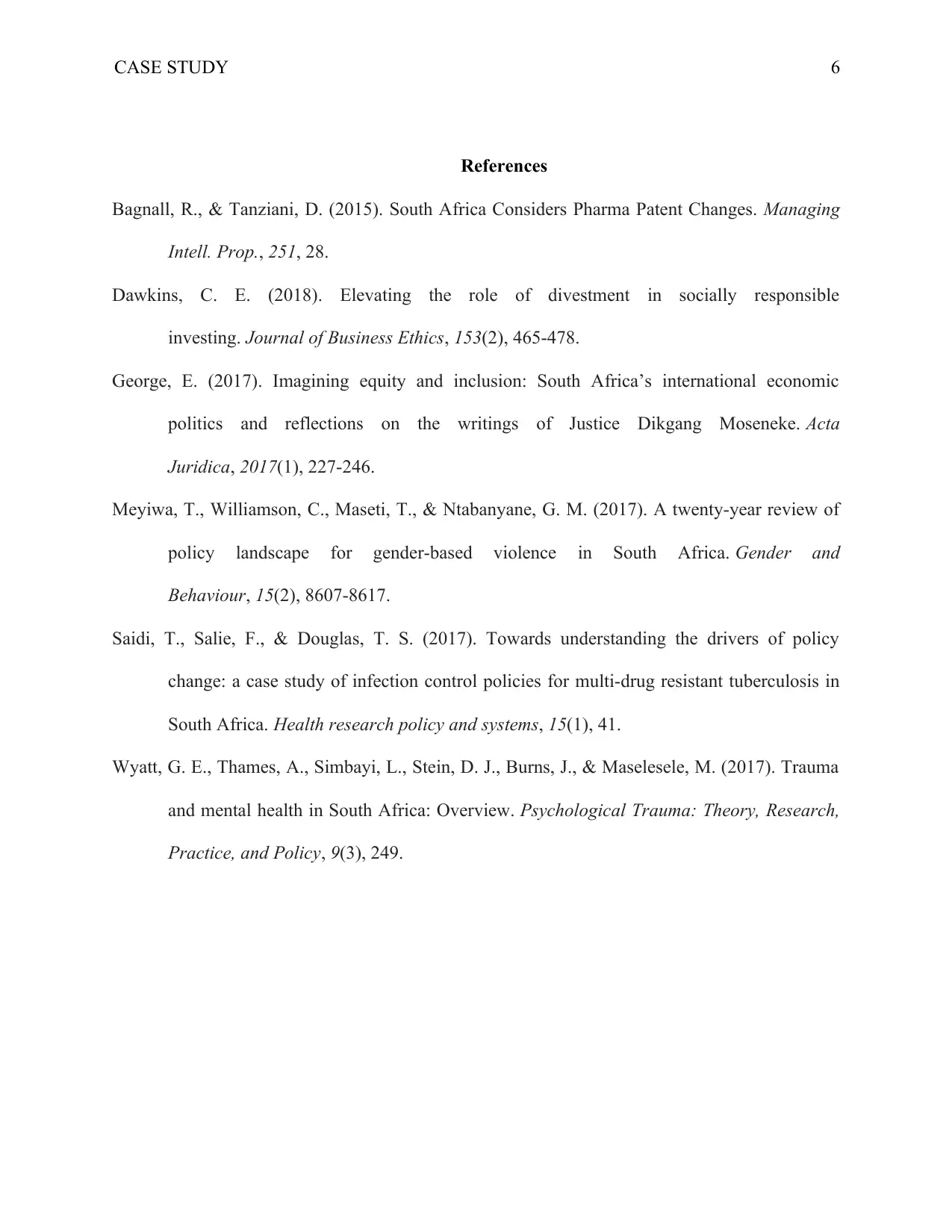
CASE STUDY 6
References
Bagnall, R., & Tanziani, D. (2015). South Africa Considers Pharma Patent Changes. Managing
Intell. Prop., 251, 28.
Dawkins, C. E. (2018). Elevating the role of divestment in socially responsible
investing. Journal of Business Ethics, 153(2), 465-478.
George, E. (2017). Imagining equity and inclusion: South Africa’s international economic
politics and reflections on the writings of Justice Dikgang Moseneke. Acta
Juridica, 2017(1), 227-246.
Meyiwa, T., Williamson, C., Maseti, T., & Ntabanyane, G. M. (2017). A twenty-year review of
policy landscape for gender-based violence in South Africa. Gender and
Behaviour, 15(2), 8607-8617.
Saidi, T., Salie, F., & Douglas, T. S. (2017). Towards understanding the drivers of policy
change: a case study of infection control policies for multi-drug resistant tuberculosis in
South Africa. Health research policy and systems, 15(1), 41.
Wyatt, G. E., Thames, A., Simbayi, L., Stein, D. J., Burns, J., & Maselesele, M. (2017). Trauma
and mental health in South Africa: Overview. Psychological Trauma: Theory, Research,
Practice, and Policy, 9(3), 249.
References
Bagnall, R., & Tanziani, D. (2015). South Africa Considers Pharma Patent Changes. Managing
Intell. Prop., 251, 28.
Dawkins, C. E. (2018). Elevating the role of divestment in socially responsible
investing. Journal of Business Ethics, 153(2), 465-478.
George, E. (2017). Imagining equity and inclusion: South Africa’s international economic
politics and reflections on the writings of Justice Dikgang Moseneke. Acta
Juridica, 2017(1), 227-246.
Meyiwa, T., Williamson, C., Maseti, T., & Ntabanyane, G. M. (2017). A twenty-year review of
policy landscape for gender-based violence in South Africa. Gender and
Behaviour, 15(2), 8607-8617.
Saidi, T., Salie, F., & Douglas, T. S. (2017). Towards understanding the drivers of policy
change: a case study of infection control policies for multi-drug resistant tuberculosis in
South Africa. Health research policy and systems, 15(1), 41.
Wyatt, G. E., Thames, A., Simbayi, L., Stein, D. J., Burns, J., & Maselesele, M. (2017). Trauma
and mental health in South Africa: Overview. Psychological Trauma: Theory, Research,
Practice, and Policy, 9(3), 249.
⊘ This is a preview!⊘
Do you want full access?
Subscribe today to unlock all pages.

Trusted by 1+ million students worldwide
1 out of 6
Related Documents
Your All-in-One AI-Powered Toolkit for Academic Success.
+13062052269
info@desklib.com
Available 24*7 on WhatsApp / Email
![[object Object]](/_next/static/media/star-bottom.7253800d.svg)
Unlock your academic potential
Copyright © 2020–2026 A2Z Services. All Rights Reserved. Developed and managed by ZUCOL.





